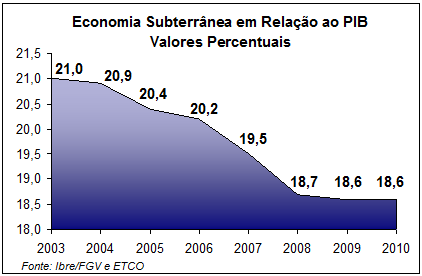 View the PDF Presentation
View the PDF Presentation

São Paulo, November 24, 2010 - The Underground Economy Index released today by the Brazilian Institute of Ethics in Competition (ETCO) together with the Brazilian Institute of Economics of the Getulio Vargas Foundation (Ibre / FGV), with the 2009 revision and update for 2010, it shows a data not observed since it started to be estimated in 2003. After spending 5 years - between 2003 and 2008 - growing less than the GDP, the Underground Economy grew with the same speed of the GDP and the curve of the relation of the Index with the GDP stopped falling, showing a trend of stabilization at around 18,6%. This means that, in the last three years, the Underground Economy has grown at the same rate as the Brazilian Gross Domestic Product, which is worrying for the country's economy.
From the point of view of absolute values, the analysis of today's results also presents a new milestone: the Brazilian underground economy, which comprises the set of activities related to the production of goods and services deliberately not reported to governments, in 2010 surpassed the mark of R $ 650 billion. In July of this year, Ibre / FGV and ETCO announced that the values estimated in reais, in 2009 reached R $ 578 billion, an amount equal to Argentina's GDP.
|
Size of the Underground Economy
|
| |
% GDP
|
In millions of reais
|
| |
Current Currencies
|
Reais at 2009 Prices
|
|
2003
|
21.0%
|
357388.7
|
523524.6
|
|
2004
|
20.9%
|
405317.3
|
549560.6
|
|
2005
|
20.4%
|
438417.5
|
554465.9
|
|
2006
|
20.2%
|
478455.2
|
570044.5
|
|
2007
|
19.5%
|
518520.1
|
583533.8
|
|
2008
|
18.7%
|
562276.3
|
589217.4
|
|
2009
|
18.6%
|
583663.6
|
583663.3
|
|
2010*
|
18.6%
|
656621.5
|
627438.3
|
|
Source: Own elaboration
* Growth forecast of 7,5% of GDP and 5% of inflation in 2010
|
“The disclosure of absolute values is essential to avoid having the mistaken view that stabilization in relation to GDP is positive. As in 2009, this year another R $ 656 billion should be left out of the Brazilian formal economy ”, comments Fernando de Holanda Barbosa Filho, a researcher at Ibre / FGV and responsible for the study.
In the view of André Franco Montoro Filho, ETCO's executive president, it is necessary to reflect deeply on the reasons for the current results, so that public policies that are really effective are designed, so that the importance of the underground economy in Brazil gradually becomes less.
For him, the growth of the economy has a double and antagonistic effect on informality. “On the one hand, growth generates an institutional modernization that encourages the formalization of economic activities, but on the other, income growth increases the consumption of goods and services, including those produced in the underground economy. The results released indicate that the second effect has been prevalent in recent years, ”says Montoro Filho.
Informality, in addition to its relationship with organized crime and precarious employment relationships, brings direct damage to society, creates an environment of transgression, stimulates opportunistic economic behavior with a drop in the quality of investment and reduces the growth potential of Brazilian economy. In addition, it causes a reduction in government resources for social programs and investments in infrastructure.
About ETCO
Founded in 2003, the Brazilian Institute of Ethics in Competition is a civil society organization of public interest -OSCIP- with the objective of promoting competitive ethics to improve the business environment and stimulate economic growth. For this purpose, it develops actions to combat competitive imbalances caused tax evasion, informality, forgery and other misconduct. It also seeks to make society aware of the social harms of unethical practices and their negative effects on the country's growth. The ETCO comprises six sectorial chambers, bringing together companies in the technology, medicine, fuel, tobacco, beer and soft drink segments.






